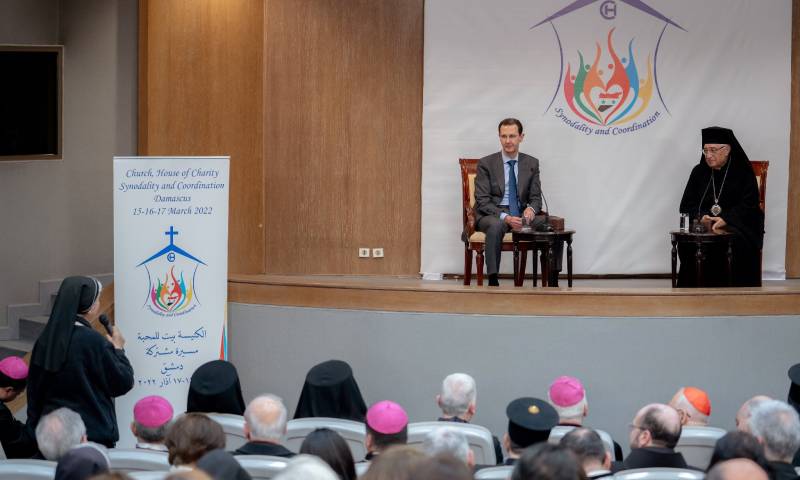On 19 March, the head of the Syrian regime, Bashar al-Assad, met with representatives of humanitarian, social, and developmental associations and institutions participating in the recently held International Ecclesiastical Conference in the Syrian capital of Damascus.
The state-run Syrian Arab News Agency (SANA) cited al-Assad as saying that “The citizen of Christian faith in Syria has never been a “guest,” nor a “passenger” citizen, but a true partner in work and production.”
He added that “The displacement of Christians is a primary goal of the external plans for the region, but it is mainly an Israeli goal, because when the countries of the region are divided into different sectarian states, each with a single color, then Israel will become part of the natural fabric. Therefore, preserving the region’s texture and its diverse identity are a need that we must defend.”
The three-day conference was held in Damascus under the theme “Church is a house of love” with Arab and international participation and was concluded on 17 March.
The Syrian regime promotes itself as the protector of minorities in Syria in light of the rise of Islamic jihadist organizations.
The number of Christians in Syria was estimated at 2.2 million persons in 2011 but fell to 677,000 in 2021, according to the World Christian Persecution Index published by the non-profit Open Doors Organization.
A segment of Christians, including most of the leaders of Syrian churches, support the Syrian regime because their political and economic interests are intertwined with it. Others support it as a guarantee for the security of Christians in Syria, according to a study entitled “Christians and the Revolution in Syria” issued by the Malcolm Kerr-Carnegie Middle East Center in April 2016.
Still, many young Christians participated in peaceful demonstrations during the first months of the Syrian revolution and engaged in various initiatives aimed at informing society of the demands of the revolution and mobilizing support for it.
The authority-directed religious discourse to Syrian society contributes to the formation of a fundamental aspect of people’s identity, for it is directly linked to the problems and challenges of reality.
The focus on the concept of sanctity enabled the religious discourse to assume distinctive importance in any society. In Syria, the al-Assad regime utilized religion as a tool to pass certain ideologies to society’s targeted segments after limiting the powers of famous religious figures under governmental guidance.
The religious institution’s submissiveness to authority helped the al-Assad regime strengthen and back its governance, exploiting the great importance people attribute to religious matters and their effect on their behaviors, experiences, and decisions. This utilization created several problems for the Syrian society throughout al-Assad’s reign.
Syria’s Ministry of Social Affairs and Labor (MOSAL) maintains handwritten files on registered civil society associations, including Islamic ones. Information about associations, although limited, is considered confidential by officials, implying that civil work in Syria is a state secret that cannot be disclosed. This significantly impacted the performance of Islamic associations, their fundraising, and networking, according to a 2012 briefing paper by the International NGO Training and Research Center (INTRAC), entitled “The NGO Sector in Syria – An Overview.”
This article is translated and edited by The Syrian Observer.

